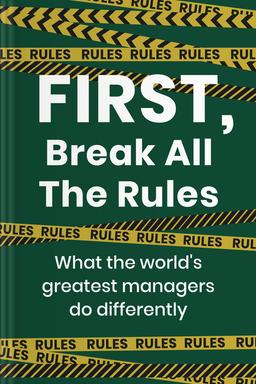You’ll learn
- How to direct, not dictate
- Pointers to find a perfect job candidate
- What “manage by exception” means
- About three categories of talents
Protect the world’s peace. Donate to support Ukraine

first KEY POINT
Contrary to popular belief, great managers worldwide have very little in common. Lining them all up, you'll encounter diverse genders, ethnicities, age groups, and body types. Each of them has different styles of motivation, direction, and relationship building.Deep within all these variations, however, there is one thing they all have in common. After interviewing tens of thousands of great managers, Marcus Buckingham and Curt Coffman discovered one insight, one shared wisdom, to which all of these managers kept returning: don't base your management on rigid, standard rules.Great managers break all the rules. They ignore the conventional school of thought that says a manager's job is to identify worker weaknesses and devise a plan to correct and overcome them. Instead, they believe that people don't and probably can't change most of the traits they carry. Good managers know it's futile to demand change or perfection and concentrate instead on developing employee strengths.
The distinction between a manager and a leader is often more profound than many perceive. Companies that fail to admit this distinction often struggle to stay afloat. Great managers should be recognized for encouraging excellent performance from their employees. That is not the same as being a great leader.Great managers aren't merely future executives awaiting their turn; they organize and keep everything on track. Likewise, great leaders inspire and innovate beyond mere management experience. Someone can be a brilliant manager and a terrible leader. Similarly, it is just as possible for someone to excel as a leader and fail as a manager.In this summary, you will learn the attributes of great leaders and how they contribute immensely to the progress of their organizations through excellent decision-making.
second KEY POINT
The conventional managerial school of thought says that when recruiting, you should choose a person based on their experience, intelligence, and determination. But if you want to be an excellent manager, you have to break this rule. Like all great managers, you should select recruits for their talent.To regular managers recruiting new employees, experience, willpower, and brainpower are what make the difference. They particularly value experience and scrutinize a candidate's professional background closely. They also prioritize theoretical knowledge and formal education over practical savvy. For them, those with impressive academic achievements can naturally “grasp things” more efficiently. They leave talent out of the equation and consider it only as an afterthought.We tend to put an aura of “celebrity” around talents and often view them as attributes reserved for a few. The reason for this bias is that we define talent as something that belongs only to the rich and famous. We observe Cristiano Ronaldo maneuvering effortlessly past opponents and netting remarkable goals and recognize that it's not just his rigorous training or unyielding commitment that makes him stand out. Though Ronaldo possesses both, so do many of his peers. The actual reason for his exceptional performance is his innate talent.Looking at other exceptional people like Tiger Woods, Lionel Messi, and Lebron James, we see the same thing — they seem to be among the privileged few with inherent gifts. For most of us, talent is rare and precious, something bestowed on special, far-away people. These people with talent are different; they are “not us.”To great managers, the standard definition of talent is too narrow and specialized. They perceive it as a pattern of thinking or behavior suitable for effective work. To them, the right talent is essential, much more than experience, brainpower, and willpower.

Continue reading with Headway app
Continue readingfirst KEY POINT
second KEY POINT
third KEY POINT
fourth KEY POINT
fifth KEY POINT
sixth KEY POINT